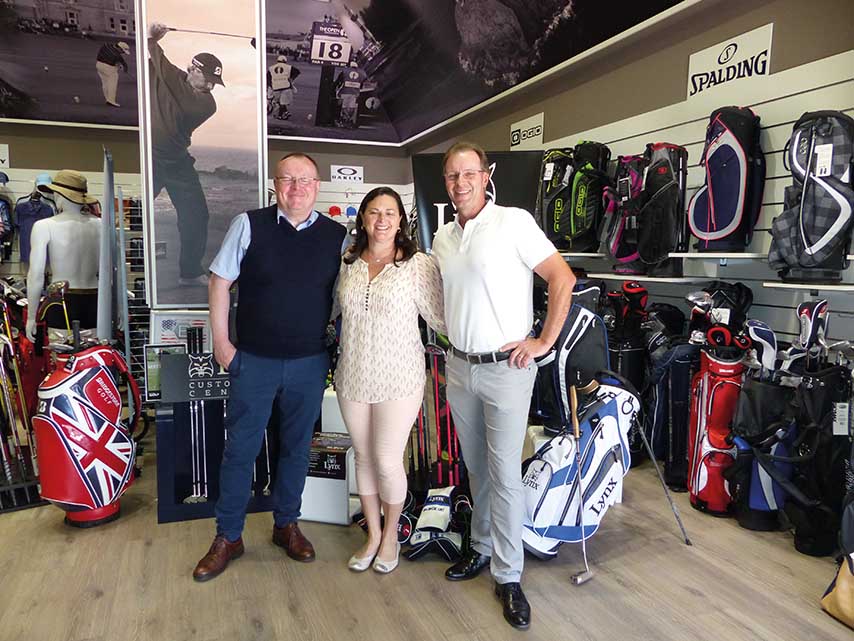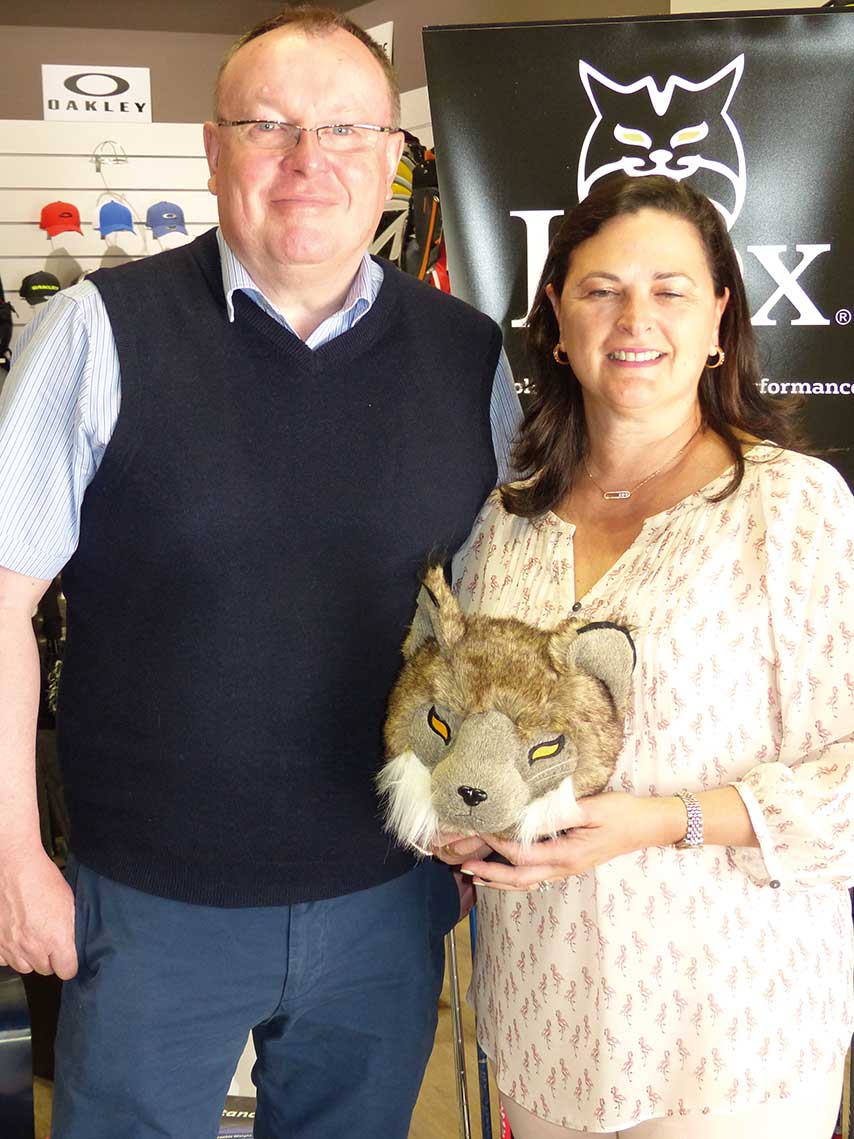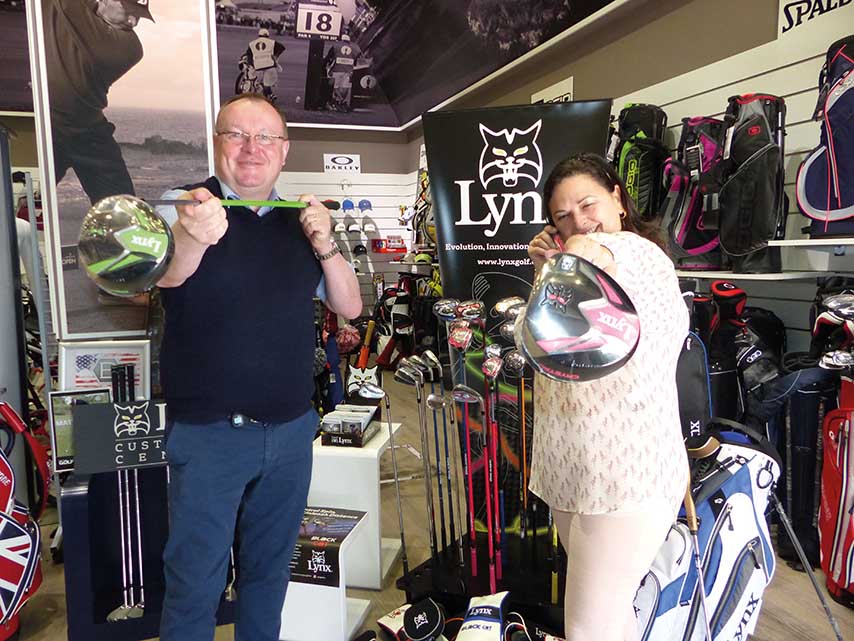After five years “getting all our ducks in a row” in the UK, Lynx owners Stephanie Zinser and Steve Elford are now distributing their venerable brand in Spain – in an exclusive agreement with Holiday Golf.
Andalucía Golf/España Golf spoke to the couple during their visit to the Costa del Sol in May to check out Holiday Golf’s cutting-edge boutique-warehouse in Marbella, play a little golf and enjoy the area’s celebrated spring climate and Mediterranean lifestyle.
Stephanie Zinser and Steve Elford brought considerably distinctive career experiences to the business when they decided to buy Lynx five years ago. Steve had been in the golf trade since 1982 and was “at the stage when I was looking for something different to do in golf”. Stephanie had a background in finance, having worked in the City before also branching out into journalism.
“The trademark became available and I talked to Steph because we really wanted to do something together. I was around in the eighties and nineties when Lynx was probably one of the top two or three golf brands in the world, so the thought of owning it was obviously very exciting.”
There were issues – serious ones – to resolve. “It was a dormant brand,” says Stephanie. “Lynx went into financial difficulties in the late nineties and a group of avid golfers, mostly celebrity names like Freddy Couples and Bill Murray, bought the brand but unfortunately they put it back into receivership within 12 months. There’s a difference between loving and being good at playing golf and actually running a business. So it lingered around on the sidelines. It wasn’t doing anything in the European market so we took the brand on, for the UK and the wider Europe, and within 12 to 18 months we decided there was no point in doing this unless we were going to own it, so we bought it.”
“It’s all very well having a passion for a sport,” adds Steve, “but you need that really good business brain which Steph definitely has. So my golfing knowledge and her business skills have been a very good combination.”
Stephanie concurs. “Steve obviously knows everything about golf. It’s almost in his DNA now. I came to this not knowing anything about golf – I’d never even held a golf club – but in many ways we complement and plug each other’s gaps. Having said that, when it comes to the branding and marketing and the vision we have for the company we are totally on the same page. It’s unfailing, and I think if you want to develop a strong identity you have to be very definitive about your focus. You have to have a very strong vision of what you want that brand to be and how you want it to look and feel to the public and the people you are selling it to.”
At first, recalls Steve, “People underestimated our ambition. They thought we just wanted to be another little golf brand and would only be there for a season.” Now, after a difficult first couple of years, they have doggedly proven to the doubters that they are in it for the long game.
When you took over Lynx, what was it that attracted you to the company?
Stephanie: When we took on the business it wasn’t just a matter of, “Oh we’re going to make golf clubs, we’re going to be Lynx” – it was so much more than that. Obviously we had respect for and recognition of what the brand stood for before. And if you speak to anyone who played Lynx or used Lynx, there are always hugely fond memories of the brand… great performance, a good legacy of winners and people playing it, innovative and fresh.
We also said, if we’re going to do it we’re going to do it in the right way, so it’s not just about product. We put huge attention into the product, don’t misunderstand me, but the key for us is also about servicing our customers efficiently, effectively, with care and concern, and with dynamism. It’s about making sure we play our part in helping people enjoy the game. It’s about fun.
In how many sports can a seven-year-old play against a 75-year-old? I’ve played with Laura Davies (one of Lynx’s team of players). I barely have a handicap. She is a legendary golfer. We can play on the same team, we can play in a fourball, we can play together. It’s awesome and people need to understand that. Plus there are the health benefits. And the argument about time is not real because people go cycling now and they’re out on their bikes for five or six hours.
It is also true, however, that younger people with shorter attention spans, and others with limited free time, need to be attracted to golf. How does the game do that?
Stephanie: We think we need to do lots more about the format. The golf sixes is a great format. I think they should be doing more “clover leaf” golf course designs so people can do six, six and six. For mothers with children, provide a crèche or put the little ones into a golf lesson for an hour and a half. You go round and do six holes, then you both have lunch. You know, that sort of thing; it could be so much more.
Steve: “Nine and dine” is a concept they have in the States a lot. It’s not a bad idea – it works. Five o’clock you finish work, maybe take a buggy, and just nine holes. You’re done in an hour and a half.
Stephanie: It shouldn’t be a slog – it should be fun.
And also not too expensive for people starting out, especially youngsters?
Stephanie: Our Predator range is open stock. We want to respect our customers. It’s great for us as a business if we can sell a whole set of golf clubs but you know how quickly children grow and yes, sometimes they do get bored with it or sometimes they will say, “Ah, I don’t really like that.” And if you’re a parent and you’ve just forked out for a whole set of golf clubs and then John or Jemima decide not to play, what a waste. But if you’ve gone out and bought them a seven-iron, and they’ve hit it and they go, “You know, I really like that”, and you buy them a driver next. I don’t think that disrespecting customers is a really profitable thing long run. We’re looking for long-term business. There is so much corporate abuse of customer goodwill amongst some of the giants.
Steve: One of my biggest motivations when we first did this was because I’d been in the trade a long time and seen the way some companies were treating customers. It was nothing short of disgraceful. And I predicted, to much ridicule actually, about three or four years ago, that one of the major brands was on a road to ruin. You can’t keep getting more market share. It’s impossible, because once you have 100 per cent what do you do then? They never did anything with the long term in mind. They did everything that would get them a sale for their shareholders, for that quarter, and that’s a disgraceful way to run your business in my opinion. They took the mickey out of the end user to be honest.
Stephanie: Plus, what is it saying about what you produce, your product? Does that really say, “We’re proud of what we’ve made”? Of course not, because if you were that proud of it why would you change it within three weeks?
So what is the normal Lynx product cycle?
Steve: Two years. The other companies, well, sometimes three to six months. I mean six months would be ages for them! What they seem to be doing now is staggering product launches throughout the year more.
Stephanie: I think that’s just a way of masking the fact they are changing things quite a lot. Obviously, if we notice that something’s not quite right, if there’s a zip wrong on a bag or something, we’ll make an in-line change because why would we not want the customer to benefit from our discovery of something that could be improved? We always want to do that but generally we take pretty much half of our entire range and we change that in year one and the other one in the following year two, so you’re running a rolling two-year cycle. But not everything changes at once. As for things that are very popular, if it ain’t broke why fix it?
What are your most popular products?
Stephanie: Black Cat’s been incredibly popular. We’re on our third re-order already. We’re struggling to keep up with demand for that.
Steve: The Black Cat driver’s had a stunning record. It just got called a “cannon” in a review in a magazine that has not been the kindest to us!
How important is your relationship with pros?
Stephanie: Very, and they’ve got the opportunity to take the business back as well. For a long time they’ve been hurt by the online distributors but there is obviously a big move towards custom-fitting and I think it’s quite an important move because actually everyone is different, everyone swings differently. Just the swing speed alone would probably dictate what shaft you used, because of the kick point and where it hits, so custom-fitting is quite an important thing, and you cannot do custom-fitting online. So they have a massive opportunity to take back so much of this business that’s been previously sucked out of their hands.
We see that as something we need to do help them, so we’ve made huge investments in providing custom-fitting carts to the pros who stock us and they have got all the latest kit in them… inter-changeable heads, exotic shafts, a range of shafts that we use. It’s not cheap but we’ve invested in them because people try them, they find what works for them and they actually will be happy with their clubs. As happens often during our demo days, someone will come along and say, “I’ve just spent x amount on some top-flight PXGs or something and I hate them.” And then they try our clubs and they’ll go, “Oh my god, I hate them even more now because this is amazing. it’s just boomed it 30 yards past what my PXG did.” And this is just an off-rack driver!
Steve: I’m going to namedrop now. We got invited last year to play nine holes, just the two of us, with Gary Player. How good is that! He saw me hit my Black Cat. I’m not a massively long hitter, and he said, “That spins really interestingly. Do you mind if I have a go? Let me hit one more Callaway first.” He hit one with his Callaway pretty good, and he hit a Lynx 20 yards past.
In addition to Laura Davies, you have several other top names helping to promote the Lynx brand, including senior champion Paul Eales and former tour pro and current TV commentator Nick Dougherty. What is the relationship like with them?
Stephanie: They’re so supportive and they really want to see us succeed and likewise we really want to see them succeed. So it’s a complete synergy of desires. And it’s a really warm relationship. When they come in to see us it’s just like friends. And that’s what we want. We want partners; we want friends. We’re not interested in paying someone loads of money who couldn’t give a damn about who we are and just goes through the motions. We want people to want to play with our clubs because they work for them.
Spain is the 15th country you are distributing to, including Denmark, Sweden, Norway, Iceland and Austria. Why now?
Stephanie: A lot of people might say, “Well why haven’t you been out earlier?” Well the reason is because we wanted to make sure we had our systems and everything logistically completely worked out. We’ve worked through all the system wrinkles, and we’ve got the product where we want it to be. Every year we will look back at last year’s product and say, “That wasn’t good enough, didn’t like that, that could be improved, what could we do better”, because it’s got to be like that. We focus on what we can do better and we hope that the business will look after itself.
There’s no point throwing a brand out into Europe if you haven’t got all your ducks in a row, so you can present a cohesive, properly thought out product for the market. We don’t have shareholders. We two own the company, we have no external debt, and therefore all the onus is on us to get it right. But I’m quite cautious. We’re bold on one level, starting a venture like this, but on another level I’m really cautious and I want to make sure that all my boxes are checked, that all my detail is correct before we take the product somewhere else.
Europe is a different animal. Every part of Europe has different buying dynamics, style of people, style of selling/buying, playing, everything, so you need to know that your product and the way you service it is robust enough to cover all of that.
You have said you want to “put Lynx back to where it was”. Where is that?
Stephanie: World domination (laughs).
Steve: I’d like to see Lynx thought of as one of the top three or four brands in the world again, definitely. We had a very nice hand-written letter sent to us from one of the founders of Lynx, to say he thought what we were doing was incredible, that it kept to the spirit of the brand, and he was so excited for us. I get goosebumps just thinking about it.
Stephanie: We are focused on what we’re doing. There’s a part of us that looks around to see what everyone else is doing but then we put the blinkers on, because my feeling is that if you look too much about to see what other people are doing, first of all you are distracted and secondly you will lose your own focus. You do what you want to do and do it well. I don’t want to copy anyone else. And we’ll live and die by it. If we get it wrong, there’s only two people’s money that’s being lost here. I think we have to stay hungry and we have to stay humble and not get big-headed about any successes we have.
Steve: We once went to a local restaurant that had just opened and they were doing quite nicely. We arrived and asked, “Have you got a table?” The maître d’ replied, “Have we got a table! Don’t be daft: we’re very popular.” And he said it in such an arrogant way I thought, you’ve got to be upsetting everyone with that attitude. And now they’re empty. I don’t want to get successful and then be all cocky about it. In fact, if anything I want to be more humble at that point, and make our customer service even better.






